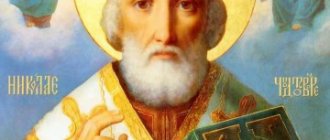The Orthodox lived and did not grieve, when suddenly the Internet came. In addition to its positive aspects, it became possible to exchange absolutely any information. And then it began! It turns out that we pray incorrectly, we don’t stand up straight, we watch films that are not pleasing to God, etc.
The ignorant tried to turn Orthodoxy either into empty formalism or into a collection of superstitions. And so, time after time, people arise who ask: “Father, why can’t we wish good luck to the Orthodox?” But the priest doesn’t even know what to say. And he had never even heard that it was impossible. And then they demand to explain why.
On the Internet they quote the words of Elder Cleopas, as if luck is the name of a demon or demon
Here is one text in circulation on the Internet. It is copied and even quoted on a number of Orthodox resources.
More or less educated people are amazed at how widespread various kinds of fiction are becoming.
Due to a translation error, belief in the god Moloch appeared, even images of his statue. But there was no Moloch and he had nothing to do with luck. Photo: upload.wikimedia.org
Here is the text:
“Be vigilant, wish each other well-being and God’s Help, not the devil! I see that in some memorials you mentioned the demon Luck, writing: “About the luck of a daughter,” “About the luck of a son,” “About the luck of a family.” Why did you write the devil in my memorial?
Do you know who Luck was?
It was the biggest demon that mowed down millions of souls. Moloch, or "Luck", was the god of happiness among the Romans, Sumerians and Carthaginians.
What was this god Moloch, or “Luck” as we call him today? His statue, cast from copper or silver, was carried on a two-wheeled cart.
On his back was a copper stove, and in front of him was a copper frying pan; From behind, firewood was thrown into Luck until the statue became hot. And his priests carried axes in their hands, large and sharpened.
What kind of sacrifice did Luck accept?
Only infants from the hands of mothers. They came to the village where you live. They dragged the chariot of Luck with a red-hot frying pan and called, clapping their hands: “Whoever wants good luck, make a sacrifice to Luck!”
Cleopas
Archimandrite
It is attributed to the Romanian Archimandrite Cleopas (Ilie), today he is called Elder Cleopas. But with all due respect to the elder’s merits, it is worth understanding the issue thoroughly. Because anyone can make a mistake.
Elder Cleopas is sure that the word luck is the name of a demon. And this demon is called Moloch. But what is it really?
The god Moloch did not exist, although infant sacrifice was practiced in ancient times
Demon: what it looks like in Christianity
The ancient world actually knew a deity named Moloch. It was closely connected with the Molk ritual. Its essence is that in case of a difficult situation, a person had to sacrifice his first-born (or several sons).
Location of Canaan, where infant sacrifice was practiced. But they did this not for luck, but to connect with God through sacrifice. Photo: ic.pics.livejournal.com
This is called "substitutionary sacrifice."
In general, such a deity Moloch did not exist. This is simply a consequence of the incorrect transmission of foreign beliefs by Jewish authors. This is just the name of a tradition, not at all personified.
At the same time, the Jews endlessly looked for analogies and tried to identify Moloch with one of their known gods and connect it with the root mlk, which was used in the words “king” and “royal”.
This ritual is attributed to the following civilizations:
- Canaan (Phenicia);
- Carthage.
In Canaan they practiced child sacrifice, but luck had nothing to do with it.
Titus Livy's description of the Punic Wars says that in Carthage children were placed in the empty womb of Moloch. Or they placed it on the hands of Moloch, where the fire was lit.
In the book “History of Assyria” by orientalist Ragozina Z.A. there is a detailed, but not based on archeology, description:
“The statue of Moloch was built specifically for accepting human sacrifices and burning them. She was colossally tall, all made of copper, and empty inside. The head was of a bull, because the bull was a symbol of strength and the sun in its fierce form. The arms of the statue were of monstrous length, and victims were placed on the huge outstretched palms; hands, moved by chains on blocks hidden behind the back, lifted the victims to the hole located in the chest, from where they fell into the flaming inferno, which was placed inside the statue, on an invisible grate, and the ash and coals falling through it formed an ever-increasing heap between the legs of the colossus ... the children were laid alive on the monster’s terrible, red-hot palms.
Relatives were strictly forbidden to show sadness. Children, if they screamed while they were being prepared for the terrible ritual, were calmed down with caresses. As ugly and impossible as it may seem, mothers were obliged not only to be present at the terrible celebration, but to refrain from tears, sobs and any manifestation of sadness, because otherwise they would not only lose all the honor due to them due to the great honor bestowed upon them by the people, but they could bring the wrath of the offended deity upon the entire people, and one reluctantly made offering could destroy the effect of the entire sacrifice and even bring upon the people troubles worse than before. Such a weak-willed mother would be forever disgraced. Drums and flutes maintained a continuous noise, not only to drown out the screams of the victims, but to increase the excitement among the people."
Ragozina Zinaida
Orientalist
Eusebius of Caesarea writes:
“The ancients had a custom according to which, during times of great misfortune due to danger, the rulers of cities or people gave their most beloved child to be slaughtered to the punishing gods - as atonement, instead of general death. Those given up [to slaughter] were killed during the mysteries. So, Cron... when the greatest misfortunes befell the country as a result of the war, he decorated (his son from the nymph Anobet) with a royal outfit and built an altar, and sacrificed him.”
Evsenius of Caesarea
Roman historian
In scientific circles, they express the opinion that Greek authors deliberately denigrated representatives of other nations. The practice of sacrifice existed, but much earlier.
Moloch is not a god, but a distorted name for a ritual.
Human sacrifice was the reason why God allowed the Jews to drive out the inhabitants of Canaan. The Lord said that it was this religion that was disgusting to Him.
The Bible Reference reports that the remains of children who were sacrificed were discovered in Megiddo.
The Bible mentions this ritual in different contexts. Here with condemnation:
“They built high places for Baal in the valley of the sons of Hinnom, to bring their sons and their daughters through the fire in honor of Molech, which I did not command them.”
(Jeremiah 32:35)
But there is also a passage that most likely found its way into the Holy Scriptures from Canaanite sources:
“Give Me the firstborn of your sons; do the same with your ox and with your sheep (and with your donkey). Let them be with their mother for seven days, and on the eighth day give them to Me.”
(Exodus 22:29–30)
So such a ritual existed. But this is not the god Moloch. No statues for sacrifices are known to archeology, nor are prayers to him. So what is “luck”? Daemon? No, it's just a fantasy.
Demon Moloch and how to summon him
Little is known about the demonic entity. MacGregor Mathers considered Moloch one of the archdevils in the Kabbalistic worldview, who is opposed to the heavenly sephira. Other theorists claim that he is the patron of tears, for whom there is nothing better than the tears of mothers shed for children.
There are several working rituals that allow you to come into contact with the entity, although they will not provide direct communication. This makes the essence of the creature unclear - is it a separate demon or a variety of them, specializing in the destruction of enemies and destruction.
The best sacrifice and way to earn the gratitude and favor of a being is to sacrifice a child through burning, but this is not practiced now. There is another option for sacrifice - ask the child to jump over a specially built fire, at the base of which is the seal of Moloch. Thus, the child’s soul will forever be available for the use of the demon, but will not arouse suspicion among others.
Summoning an entity will require a lot of preparation. To punish the offender, you will need a piece of unwashed clothing. You should go into the valley and make a fire there with the seal of Moloch at the base. You should throw a piece of clothing into the fire and say the spell:
In nomine Astaroth Baal Beelzebub et Lucifer Evoco Moloch! Tollite sacrificium! Accede ad eam, et conteram illud comburent eam, et capient eam! Amen. Amen. Amen.
Then jump over the fire. Subsequent rituals can be performed at home using a candle flame. By performing the ritual, an agreement is concluded with Moloch, who will constantly demand new victims. If the entity does not receive the gift within a year, disaster will happen to the caster or his loved ones (most likely a fire).
The real origin of the word “luck” is from the Proto-Slavic “to give”
Any etymological dictionary will explain to us the origin of the word “luck”. This is a separate phenomenon from religion. It was formed from the word “give”, “succeed”. Similar roots exist in various Slavic languages.
The fact that somewhere someone could call their god the god of luck does not mean that from now on there is a stigma on this word or phenomenon. Is it possible to refuse love, starting from the fact that the Roman goddess of love, Venus, is pagan?
Of course not.
What if we suddenly found out that human sacrifices were made to Venus? Also no. What does it change? Some people lived a different religious life that was unacceptable to us. This is their will and their problems. This does not change anything in Orthodoxy.
Wish people good luck and don't be afraid of anything!
So, we have dealt with non-existent demons, but the main question remains: is it possible to wish the Orthodox good luck?
Even the Bible, if we take the new Russian translation, contains the word luck in a positive meaning:
“Zilpah’s maid bore Jacob a son. Then Leah said: “What luck!” And she named him Gad"
(Genesis 30:10–11)
“Nothing was saved from his gluttony, but his luck could not resist.”
(Job 20:21)
But let's imagine a little. Let's say such a coincidence happened that there was a certain demon, and today luck is called by his name. Or he himself was responsible for making people lucky.
And now you wish your loved one good luck in some business with all your heart. You want him to succeed. But human efforts alone are often not enough. So many circumstances influence our lives! You can't predict everything. That’s why we say: “God help you” - because such help is never superfluous to a person.
It is important not what you say, but what meaning you put into it.
Or you can say abstractly: “Good luck to you.” And who has the right to accuse the speaker of bringing in some kind of demon that he doesn’t even know about? It is not what we say that matters, but what meaning we put into it.
We call diseases venereal, but do we really mean the Roman goddess of love or the second planet from the Sun? No. Words even with the same roots can have different meanings.
So Father Vladimir (Golovin) in the video below says that the essence of the phrase is important, and not its secret meanings:
Link to video:
But at the same time, the priest warns that the word “luck” must be understood correctly. Luck is not when I sit and wait for something to happen for me. Luck is success that is achieved through one’s own efforts.
A Christian is not a passive person, but one who acts. One whose words and actions are consistent with each other. He understands luck as an addition to his efforts, a certain guarantee, God’s will that everything will ultimately work out in the most prosperous way.
Moreover, luck does not imply fate. Christians don't believe in it. It implies that everything is in the hands of God and man. Wish people good luck and don't be afraid of anything!
By leaving a comment, you accept the user agreement
Prayer for God's help for a good deed
Heavenly King, Comforter, Soul of truth, Who is everywhere and fulfills everything, Treasure of good things and Giver of life, come and dwell in us, and cleanse us from all filth, and save, O Good One, our souls.
O Creator and Creator of all things, O God, hastily correct the works of our hands, which we begin for Thy glory, with Thy blessing, and deliver us from all evil, for One is Omnipotent and Lover of Mankind.
Quick to intercede and strong to help, present yourself to the grace of Thy power now, and bless and strengthen, and accomplish the good work of Thy servants: whatever you want, as the Almighty God is able to do.
Lord Jesus Christ, the Only Begotten Son of Your Beginning Father, You declared with Your most pure lips: that without Me you cannot do anything. My Lord, Lord, with faith in my soul and heart spoken by You, I fall down in Your goodness: help me, a sinner, to accomplish this work, which I have begun, in You, in the name of the Father, and the Son, and the Holy Spirit. Amen.










